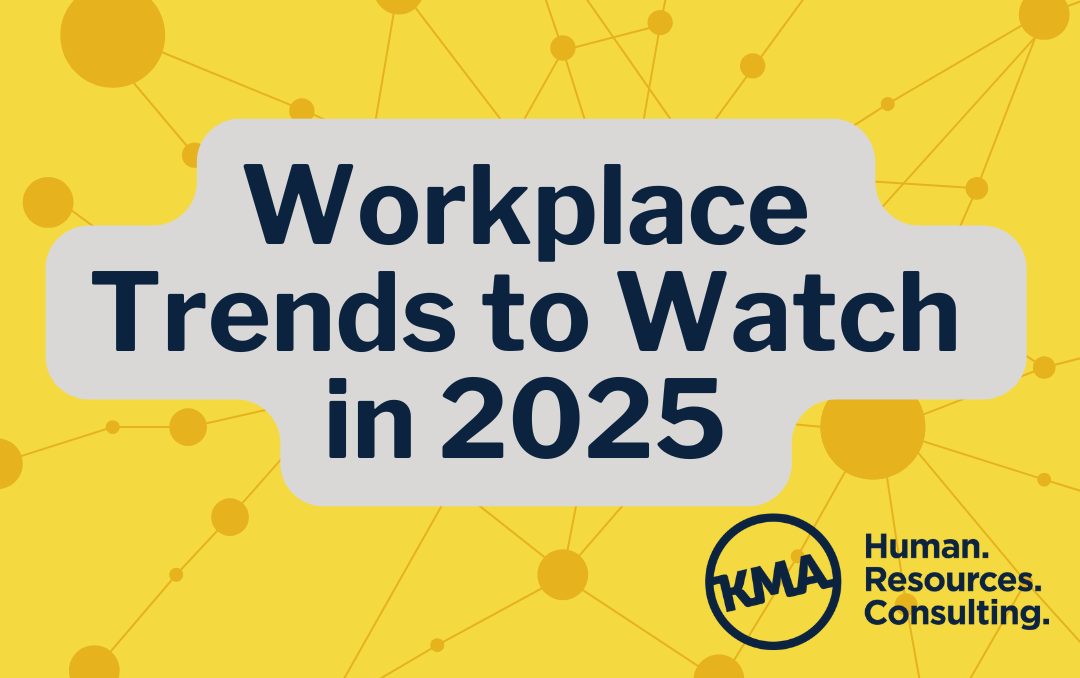By the KMA Team

Each year in Q4 the team at KMA focuses on year-end best practices for our clients, as well as planning for what to expect in the year ahead. With a new administration taking the helm in January, there will be a great deal of change to navigate, so we are buckling up.
Even though most changes in legislation and the economy will likely not have an immediate impact, we’ve got an update on some of the trends that are set to influence workforce management and recruitment strategies in 2025. Here’s what we’re forecasting.
Hybrid Work the New Normal
Flexible work arrangements will remain the norm, and companies that continue to embrace hybrid models will be best positioned to attract and retain talent. Despite a recent movement of some companies demanding a return to office some or all the time, employees are not on board, and if given the choice to work for a company that offers flexibility versus one that doesn’t, they will choose the former. In our 2024 Employee Benefits Survey Report, 94% of respondents offer some form of flexible work.
A follow-on trend is the growing gig/freelance economy. Some skilled professionals are turning away from corporate life to embrace a freelance work model, offering them full control of the type of work they are doing, as well as when and where. In addition to the flexibility benefits, selective project work can often be more rewarding intellectually and financially.
Continued Support for Employee Well-Being and Mental Health
Employee well-being and mental health remain at the top of the list of HR priorities, spurred by the long-term impact of pandemic-driven stress and burnout, technology replacing meaningful relationships, an increasingly isolated and polarized population, and an overarching culture of loneliness among all generations. In 2025, the focus on employee well-being is expected to deepen, with more companies offering wellness programs, mental health resources, and flexible work options.
Another finding from our 2024 Employee Benefits Survey Report is that 82% of respondents offer some type of wellness benefit. According to the World Health Organization, for every $1 invested in mental health, there is a $4 ROI in improved productivity. Clearly, employee wellness is not just a nice-to-have initiative, it’s a necessity that impacts the bottom line.
Growing Adoption of AI and Automation
Another trend that we’ve seen explode in the last year is the integration of AI and automation in the workplace. The use case for AI is undeniable, as it can enhance the employee experience by automating repetitive and routine tasks, enabling employees to focus on higher value activities. Businesses will need to leverage the advantages AI can offer in productivity and efficiency, balanced by the qualities that make us uniquely human: experience, insight, discernment, and common sense.
Specifically in the world of recruiting, AI technology has long been the norm, and we expect to see more automation in the future to optimize the recruiting process. However, we firmly believe that human insights, empathy, and judgment will remain a critical part of finding, attracting and onboarding top talent. Read more in our interview with Debbie Pearl on what she’s expecting for 2025 in Recruiting.
Upskilling and Reskilling a Key Driver for Growth
The rapid pace of technological advancements and evolving market demands in 2025 are making continuous learning and skills development more essential than ever. According to the World Economic Forum’s most recent Future of Jobs Report, 60% of all employees will require reskilling in the next five years, as new technologies reshape roles and functions across industries. Companies that invest in continuous learning programs are better positioned to meet these challenges, harness human potential, and stay competitive.
With AI reshaping work, some traditional jobs are becoming obsolete while new, specialized roles are emerging that require distinct skill sets. Organizations committed to technology adoption will not only remain competitive, but also empower their employees to thrive in the workplace of the future. In 2025, adaptability and a commitment to lifelong learning will be vital for both company success and individual career resilience.
Diversity, Equity and Inclusion Remain Relevant
The importance of Diversity, Equity and Inclusion (DEI) will continue to matter to employees and job seekers in 2025, despite some recent push back and reconsideration of these initiatives. Earlier this year, the Society for Human Resource Management (SHRM) dropped the E for Equity from the acronym, focusing on I&D. In other cases, we have seen the addition of B for Belonging in the lineup: DEIB.
The language and theory around DEI will keep evolving, however the benefits of these efforts in terms of recruiting, retention and brand reputation will continue to be a worthwhile commitment for many organizations. Fostering a culture where all employees feel included and valued will always be a good investment in employee engagement and productivity.
Pro-Business Labor Environment
A new, more business-friendly administration will likely mean the lifting of existing labor laws, and we are already seeing this happen in the case of the DOL’s overtime rule that was struck down by a Texas court. We can expect to see less federal oversight in the workplace, less emphasis on workplace safety, and fewer worker protections in general. Complying with the intersection of state and federal legislation will be a growing challenge for businesses.
As we approach 2025, we’re reminded that the workplace is still experiencing aftershocks of a world forever altered by the pandemic, coupled with new uncertainties brought on by a changing administration. In this climate of uncertainty, staying informed and adaptable has never been more essential. KMA’s team of experts is keeping a pulse on the latest legal, technological, and people-centric developments, ensuring you’re equipped to make informed decisions for your business and your workforce.
Reach out to us today to learn how we can support your organization in building a resilient workplace for 2025 and beyond.
